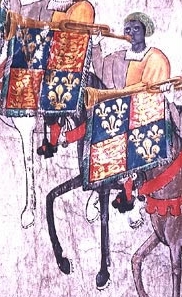British Black music
Appearance
This article needs additional citations for verification. (September 2020) |

British Black music refers to music of the African diaspora, or music derived from the African diaspora which has been produced in Great Britain regardless of the ethnic background of the musicians.
Awards
[edit]Since 1996, an annual awards ceremony has been held for Music Of Black Origin, also known as the MOBO awards.[1]
Genres
[edit]- 2-step garage
- Afroswing
- Bassline
- Britfunk
- British black gospel
- British blues
- British hip hop
- British jazz
- British reggae
- British soul
- Drum and bass
- Dubstep
- Grime
- Lovers rock
- Jungle
- Ragga jungle
- Trip hop
- UK garage
- UK funky
- UK gospel
- UK drill
- Progressive rap[2]
Organisations and events
[edit]- African Society of Literati, Musicians, and Artists (established in 1897)
- Music Of Black Origin Awards
- Urban Music Seminar
- Black Music Awards (BMA)
Notable contributors to British black music
[edit]16th century
[edit]18th century
[edit]19th century
[edit]20th century
[edit]- Samuel Coleridge-Taylor
- Southern Syncopated Orchestra
- Ken "Snakehips" Johnson
- Aswad
- Loose Ends (band)
- Junior Giscombe
- Maxi Priest
- Five Star
- Heatwave (band)
- Imagination
- Sade
- Soul II Soul
- Mica Paris
- Gabrielle
- Shola Ama
- D'Influence
- Beverley Knight
- The Specials
- Amazulu (band)
- Omar
- Lynden David Hall
- Skin (Skunk Anansie)
- A Guy Called Gerald
- Cleopatra
- Sonique
Early 21st century
[edit]- Wiley
- So Solid Crew
- Dizzee Rascal
- Ghetts
- Jammer
- Lethal Bizzle
- Skepta
- Kano
- Stormzy
- FKA Twigs
- Sampha
- Michael Kiwanuka
- Little Simz
- Raleigh Ritchie
- Lady Leshurr
- Dave
- Wretch 32
- Krept & Konan
- Central Cee
- AJ Tracey
- Tinie Tempah
- J Hus
- JME
- Leigh-Anne Pinnock
- Arlo Parks
- Shaznay Lewis
- MNEK
- Labrinth
- Rizzle Kicks
- Ms Banks
- Jorja Smith
- Kele Okereke
See also
[edit]References
[edit]- ^ Horan, Tom (25 September 2003). "MUSIC: How Ms MOBO proved them wrong". The Daily Telegraph. London.
- ^ Vinti, Mike (January 29, 2016). "Beyond Grime: Why You Need to be Paying Attention to Britain's Other Rap Scenes". Vice. Retrieved March 1, 2021.
Further reading
[edit]- Cotgrove, Mark (2009). From Jazz Funk & Fusion to Acid Jazz. Milton Keynes: AuthorHouse. ISBN 978-1438973609.
- Dabydeen, David; John Gilmore; Cecily Jones (2008). The Oxford Companion to Black British History. Oxford: Oxford University Press. ISBN 978-0199238941.
- de Koningh, Michael; Griffiths, Marc (2003). Tighten up!: The History of Reggae in the UK. London: Sanctuary.
- Fryer, Peter (1984). Staying Power: The History of Black People in Britain. London: Pluto Press.
- McGrady, Richard (1991). Music and Musicians in Early Nineteenth Century Cornwall: World of Joseph Emidy - Slave, Violinist and Composer. Exeter: University of Exeter Press.
- Oliver, Paul (1990). Black Music in Britain: Essays on the Afro-Asian Contribution to Popular Music. Buckingham: Open University Press.
- Owusu, Kwesi (2000). Black British Culture and Society: A Text Reader. London: Comedia.
- Portelli, Tony (2006). The Music Industry Raw: Pirates, Clubs, House and Garage. Milton Keynes: AuthorHouse.
- Smith, Steve Alexander (2009). British Black Gospel: The Foundations of This Vibrant UK Sound. Oxford: Monarch Books. ISBN 978-1854248961.
- Simons Andrew. Black British Swing: The African Diaspora's Contribution to England's Own Jazz of the 1930s and 1940s. Northway Publications.
- Schwartz, Roberta Freund (2007). How Britain Got the Blues: The Transmission and Reception of American Blues Style in the United Kingdom. Aldershot: Ashgate.
